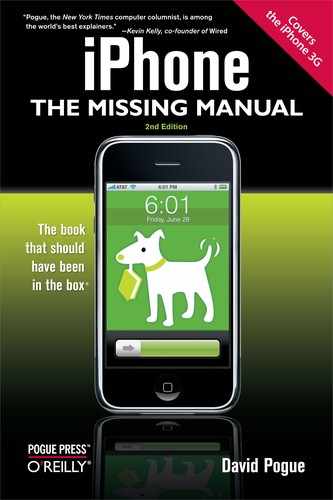Shortly before the iPhone went on sale in 2007, Apple CEO Steve Jobs announced that programmers wouldn't be able to write new programs for it. This was not a popular announcement. "It's a computer, for the love of Mike," groused the world's amateur and professional programmers. "It's got memory, a screen, a processor, Wi-Fi…It runs Mac OS X! Jeez Louise, why can't we write new programs for the thing?!"
Apple said it was only trying to preserve the stability of the phone and of the AT&T network. It needed time to redesign the iPhone operating system, to create a digital sandbox where all of those loose-cannon non-Apple programs could run without interfering with the iPhone's "real" functions.
During that year of preparation, new programs appeared on the iPhone, all right—but in forms that most ordinary iPhone fans didn't bother with. There were the semi-lame Web apps (Web Applications), which were little more than iPhone-shaped Web pages; and there were hacks.
That's right, hacks. You can't sell 6 million of any electronic goody in one year and escape the notice of the hacking community. It didn't take long for these programmers to "jailbreak" the iPhone, using special software tools to open it up (metaphorically speaking) and shoehorn their own programs onto it.
The trouble with jailbreaking the iPhone, though, is that it's not foolproof. Everything may work for awhile, but a subsequent Apple software update could actually "brick" your phone (render it inoperable, requiring a complete replacement)—and, in some cases, did. Some hacks required technical skill and a lot of patience, too.
Finally, though, Apple threw open its doors to independent programmers by the tens of thousands, and in July 2008, offered a simple way for you to get the new iPhone programs they wrote: the iPhone App Store.
"App" is short for application, meaning software program, and the App Store is a single, centralized catalog of every add-on authorized iPhone program in the world.
Nothing like the App Store has ever been attempted before. Oh, sure, there are thousands of programs for the Mac, Windows, Palm organizers, Treos, BlackBerries and Windows Mobile phones—but there's no single source of software for those platforms.
In the iPhone's case, there's only one place you can get new programs (at least without hacking your phone): the App Store.
You hear people talking about downsides to this approach: Apple's stifling competition, Apple's taking a 30 percent cut of every program sold, Apple's maintaining veto power over programs it doesn't like (or that may compete with its products and services).
But there are some enormous benefits to this setup, too. First, the whole universe of software programs is all in one place. Second, Apple says that it checks out every program to make sure it's decent and runs decently. Third, the store is beautifully integrated with the iPhone itself, making it fast, simple, and idiotproof to download and install new software morsels.
There's an incredible wealth of software on the App Store. These programs can turn the iPhone into an instant-message tool, pocket Internet radio, eBay auction tracker, medical reference, musical keyboard, time and expense tracker, home-automation remote control, voice recorder, Etch-a-Sketch, recipe box, tip calculator, currency converter, e-book reader, restaurant finder, friend finder, and so on. The best of them exploit the iPhone's orientation sensor, Wi-Fi, Bluetooth, GPS, and other features.
Above all, the iPhone is a dazzling handheld game machine. There are arcade games, classic video games, casino and card games, multiplayer games, puzzles, strategy games, and on and on. Some of them feature smooth 3-D graphics and tilt control; in one driving simulator, you turn the iPhone itself like a steering wheel, and your 3-D car on the screen banks accordingly. Watch out, GameBoy.
No matter how much giddy fun the App Store is, you should know three caveats. First, some iPhone apps are crashy. Sometimes just opening the program is enough to crash it (you return to the Home screen automatically) or even crash the iPhone (you return to the Apple logo as the iPhone restarts). See the end of this chapter for some troubleshooting tips.
Second, some of the programs, especially 3-D games, are huge power hogs that can drain your battery darned fast.
Third, the App Store may be habit-forming. It also may help you justify getting that 16-gig iPhone model instead of the 8-gig.
